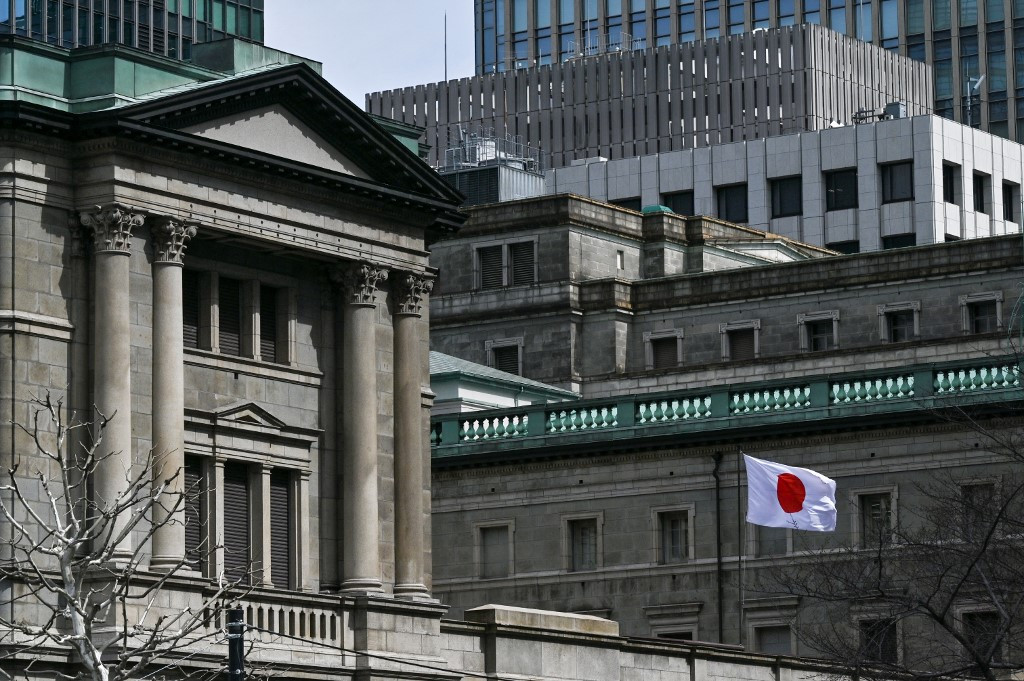Popular Reads
Top Results
Can't find what you're looking for?
View all search resultsPopular Reads
Top Results
Can't find what you're looking for?
View all search resultsBank of Japan holds rates and warns of trade uncertainty
Officials began lifting borrowing costs last year after nearly two decades of ultra-loose monetary policies aimed at kickstarting torpid growth in the world's number four economy.
Change text size
Gift Premium Articles
to Anyone
T
he Bank of Japan left its key interest rate unchanged Wednesday and warned about the economic outlook amid global uncertainty fuelled by Donald Trump's trade war.
Officials began lifting borrowing costs last year after nearly two decades of ultra-loose monetary policies aimed at kickstarting torpid growth in the world's number four economy.
But since coming to office in January the Trump administration has embarked on a hardball campaign to rectify what it says are unfair trade imbalances, and imposed levies on multiple trading partners and imports including steel.
The uncertainty unleashed by that has forced central banks around the world to reassess their recent monetary policies.
On Wednesday the BoJ, after a two-day meeting, said it would stand pat on its key rate, having lifted it to a 17-year high of around 0.5 percent in January.
In a statement it said: "There remain high uncertainties surrounding Japan's economic activity and prices, including the evolving situation regarding trade."
Later, governor Kazuo Ueda told reporters: "Tariffs can directly affect the economy through trade -- especially production volumes, inflation and prices.
"On the other hand, tariffs, or even the prospect of tariffs, can affect the mindset or confidence of households and businesses, which could directly impact spending."
Stefan Angrick of Moody's Analytics said the BoJ statement "paints a fairly upbeat picture of the economy, which suggests the central bank is looking to tighten monetary policy further".
But "with the dust still settling from January's rate hike... the BoJ wants to gauge the impact of recent policy changes before tightening further", he wrote in a note.
SPI Asset Management's Stephen Innes said the Federal Reserve and Bank of England were also expected to hold rates this week "as policymakers take their first collective pulse check on the fallout from Trump's trade policies".
Headline inflation in Japan has been above the bank's two-percent target every month since April 2022, and a year ago it finally lifted its interest rates above zero, before increasing them to 0.25 percent in July.
Wage trends are also key, after trade unions said early data showed they had secured an average 5.5 percent pay rise for members this year, a three-decade high and up from last year's preliminary reading of 5.3 percent.
The BoJ said on Wednesday that in Japan, "the employment and income situation has improved moderately".
"If the annual spring labour negotiations lead to significantly higher wages then we believe there is a possibility for an interest rate hike in the summer and another one six months later," Katsutoshi Inadome of SuMi TRUST said.
Prices excluding fresh food rose 3.2 percent on-year in January, accelerating from 3.0 percent in December. February inflation figures are due on Friday.
The BoJ is aware that rising prices "are contributing negatively to people's lives", Ueda said on Wednesday.
"A rise in food prices, including rice... can affect the basic pace of inflation through a change in households' mindset and expectation of future inflation," he said.











